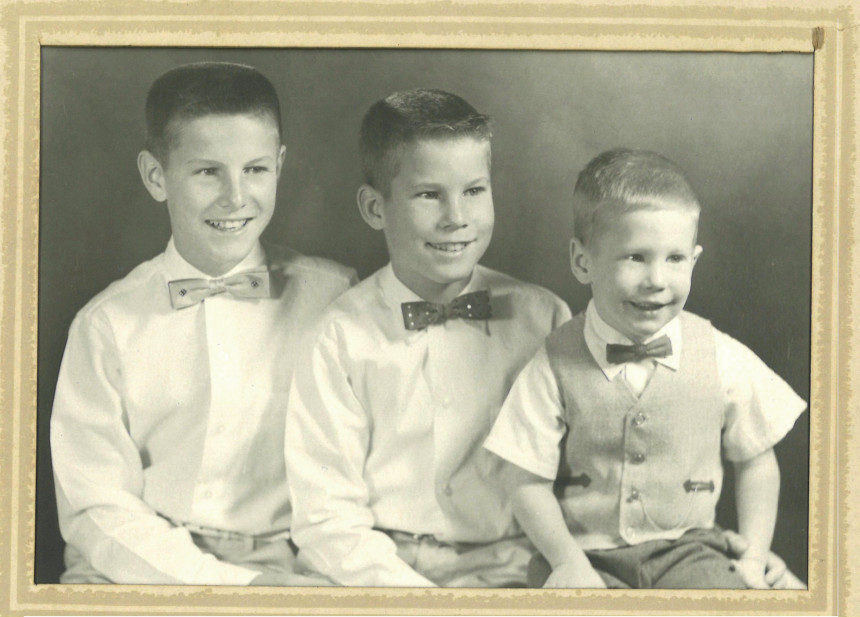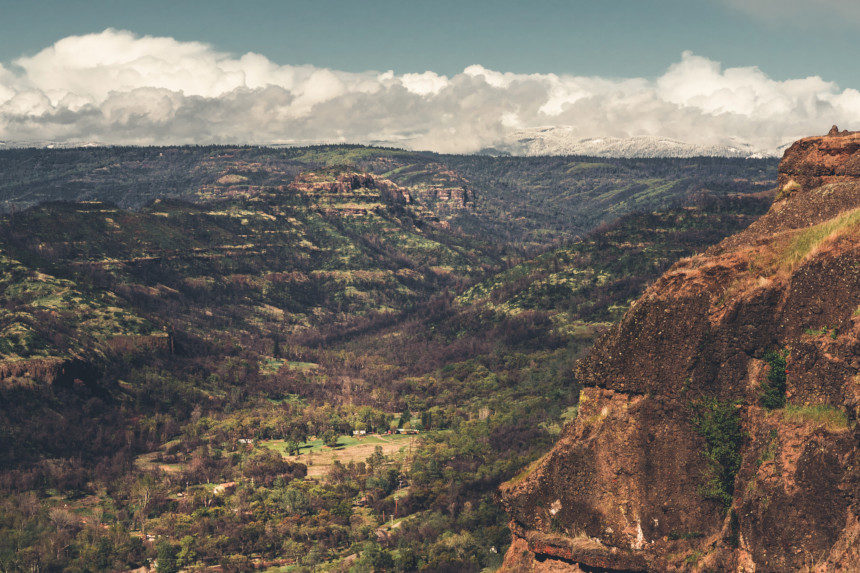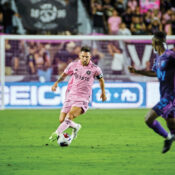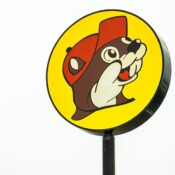When my brother was 5 and I was 7, my parents moved us to Paradise. We’d been living in the Los Angeles section known as Glendale. We lived at 521B Allen Avenue. (You never forget your address when you go off to school for the first time, do you?) It was a two-bedroom bungalow apartment. There was a driveway between the two parallel strips of postwar apartment units that opened in the back to a wide asphalt courtyard with a cement block fence at the rear and an incinerator up against that wall.
My brother Tom was always more adventuresome, so he learned how to run along the top of that wall and enjoyed taunting me from the top. He enjoyed it right up until his foot slipped and he ended up with a green fracture of his arm. After the pain was gone and the cast was set, he enjoyed getting everyone he knew or met to sign his cast. Tom strove to enjoy everything he did.
Once the cast was off, he figured out how to further bedevil my mother by inventing the “Bunkbed Launchpad.” This involved safety-pinning a white towel to the shoulders of your pajamas so it hung down in back like a terrycloth version of Superman’s cape. Then, using the flying powers of a white terrycloth towel, we would leap from the top bunk onto the mattress and piled pillows of the “guest bed.” And although we took off many times, I can say for certain that a towel is not a dependable aeronautic device. Indeed, it’s glide path resembles that of a brick.
It was only seven years after the Second World War, and peacetime life in Los Angeles was fraught with housing shortages, a population explosion as returning soldiers tried to jumpstart families, and…
and…
the smog.
Today we hear a constant plaint about air quality in Los Angeles, but that is just more endless whining about marginal problems that have overtaken those slunks among us who pass themselves off as “nice, thoughtful people,” their chatterings but the stifled screams of those spot-welded by selfishness to a metalled purgatory of their own design. Smog? They have no idea what smog is.
In the days I went to my first two grades at Benjamin Franklin School, the smog was so bad that you could — many mornings — taste it in the dew. My father went through, at times, two white shirts a day since the smog’s grime around his collar and cuffs would be visible after only a few hours. The clotheslines in the courtyard behind the apartments were so filled with billowing white shirts we could have commandeered them for our pirate vessels if we weren’t terrified of the wrath of the awakened housewives of 521B Allen Avenue.
My paternal grandparents knew the problems of post-war Los Angeles and persuaded my parents to join them in their new town up in Northern California, Paradise. And so I found myself drowsing in the backseat of the family sedan with my brother as, in a trip of two days, we drove up the Skyway to my grandparents’ handmade house. I saw them, as I woke from sleep slumped against my brother, waving to me outside the car window with tall pines behind them and flakes of snow falling softly and softly falling (to borrow from James Joyce).
We got out into the snowstorm and all went into my grandparent’s handmade house by their handmade lake with its handmade rowboat. All around their house was an apple orchard, and inside the house was a meal by my grandmother featuring her handmade applesauce.
After that, my grandfather made a bed for us in front of the wood fire smelling of dense High Sierra pine. The adults went back into the kitchen to talk and play canasta. The hum of their voices faded as my brother and I fell asleep.
It was our first night in Paradise.
Sometime later my parents bought a house on the edge of Butte Canyon, out on the fringes of Paradise. My father built a new bedroom for Tom and me at the back of the house with its own entrance stairs that incorporated the trunk of a black walnut tree. There was a cherry tree in the backyard along with a brick barbecue. Beyond the backyard was an acre of wild oak, madrone, and manzanita. Behind that was an old dirt road that ran right at the edge of Butte Canyon. The canyon here was draped everywhere by frozen flows of black lava in all shapes, and often precipitous drops. Nearby there were trails branching out and down into the canyon. On weekends and in the summer, our parents’ instructions to us were simple: “Home before dark.”
I was 9 and my brother 7 and we set off every summer and non-school morning with a couple of peanut butter and jelly sandwiches to explore this strange landscape of lava beds, High Sierra forests and streams, and abandoned gold mines.
There were abandoned gold mines everywhere in the sloping walls of Butte Canyon. You found them by following old almost-erased trails that slowly slumped downward on the canyon walls. One particular site boasted a mine with three entrances branching off into the darkness under the canyon. Some mines were said to go back several miles, but they were always too spooky and our flashlights too dim for us to venture very far inside.
Whenever we could, we’d escape out our private entrance and ramble about the canyon under the watchful eyes of buzzards roosting atop dead pines waiting for a meal. It’s strange now to say we skipped along the edges of the paths, oblivious to the potential for becoming buzzard food, but children are immortal in their own minds, are they not?

One day in … was it late autumn, or before or after? … we were following a new path when we came upon a wide and long lava bed somewhere midway down in the canyon. The lava was coal-black and had many lichen-covered stones protruding out of the crust. And in the midst of it all, there was one large lava spire that rose high above the bed below, a monolith that had felt the splash of the molten lava but had survived in a cooled lava shawl. The spire rose at least 20 feet above the canyon floor. At the top, it forked into several shards on all sides, leaving the top open. And somehow in the top, there was enough earth for, strange in this High Sierra pine forest, a stand of green bamboo to grow tall. It was like a giant lava planter with just a bit of a Chinese landscape at its top.
There was a hand-over-hand way of getting up into the bamboo at the top. We found it through the kind of determined trial and error a boy can have on a summer afternoon with nothing to do and the whole local wild world to explore. At the top, the bamboo thinned toward the center, and we squeezed inside to see the whole wide world of the canyon around us without being seen at all. It was a boy’s summer dream. It was impregnable. It was “This fortress built by Nature for herself / Against infection and the hand of war.”
And so we did what any two young boys would do. We improved our fort and hauled in supplies. With some pruning sheers that my mother convinced herself she must have mislaid, we carefully trimmed out the inside stands of bamboo until a comfortable space was made (invisible to outside eyes) for two brothers to relax in a comfortable manner. We hauled in some water in bottles and some “rations” consisting of apples, jelly sandwiches, and chocolate chip cookies. These “rations” did not last the afternoon, when we would pore over our latest comic books bought at the Paradise drug store and soda fountain.
After sober consideration, Tom and I decided that grown-ups could not be allowed to know what we were up to and where our fortress was located. To heighten our fortress security measures, we named the place “X.” After that, we always referred to it as such, confident that no eavesdropping adult would be able to break our code.
Bored with being the only unattacked fortress in California, we would sally out from the bamboo and climb down onto the lava flow to pick through the gold rush garbage dump at the bottom of the flow. The considerable garbage tip of gold rush detritus had been formed when the various gold mining operations in Paradise had been producing, from the mid-1800s to well into the beginning of the 20th century. The rush for gold was over, but there was still gold in them thar hills, and many prospectors still worked the streams, rivers, and canyons. Up and down Paradise, there were still places that were showing enough color for man to get enough of a poke for his whiskey and fixings and other needful things in their ramshackle camps along the canyon’s edge. When such needful things were used up or the gold played out, the garbage was taken to the top of the lava flow and disposed of by just chucking it over and watching it tumble until it disappeared into the tangled madrone and manzanita at the rock-studded bottom.
But what was garbage to a gold miner was gold to a couple of young boys. We found old whiskey bottles and jars of uncertain provenance. We found rusted metal sheets and rods that we fashioned into a lean-to deep inside the bamboo walls of X so we could store our comic books and other treasures. We found many things and then…
then…
Then there was the day we cut back a bunch of manzanita branches and pulled out a tightly dovetailed and nailed wooden box with the top stove in. Tom pulled back the shattered wood of the top to reveal a torn sheet of stiff brown paper. Widening the rip in the paper, we looked in and saw about half a case of dynamite composed of broken sticks on the top and whole sticks of TNT on the bottom of the box.
Were we scared of these explosives? Not for a moment. Tom was 7 and I would have been 9 years old. Not only that, but it was before the time when children were trained to be fearful before they were toilet trained.
Afraid of some dynamite? Please. We were overjoyed. At last, we had some real weapons! Better than guns! This was a boy’s nirvana.
And even though the years of winter rains had soaked the sticks through and through, the red paper casings still had all the warning signs printed on them. Perfection compounded.
We hauled the box of dynamite back up the lava flow to the foot of X. By the time we got there, we were both into a shared dream of killing waves of heil-screaming Nazis in World War II as we had seen in a hundred movies. I reached into the box and took out a half-stick of sodden TNT and heaved it a good 30 feet at the ghost Nazis until it went splat on a boulder.
Tom said, “Isn’t that a little scary?”
“It’s fine,” I said and added (betraying my limited child’s understanding of the nature and potential of trinitrotoluene), “It’s all wet. It can’t explode.”
Widening the rip in the paper, we looked in and saw about half a case of dynamite composed of broken sticks on the top and whole sticks of TNT on the bottom of the box.
Since I was the elder, Tom just nodded his head and threw his half-stick of dynamite even farther than mine until it went splat on the stones.
And so we passed a fine afternoon defending X from the Wehrmacht zombies until the evening fell and we went home to supper. We’d been dressed in those Levi jeans you bought two sizes too large and washed separately and Western-style Levi denim jackets. We tossed these war-stained togs into the hamper and dressed for dinner. I don’t remember what I thought but I’m sure I was excited that the brothers now had two secrets that the parents would never know: X and TNT.
The next day was a school day and, after breakfast, we walked down the short dirt road to the bus stop on the paved road that, over hills and through forests and orchards, would deposit us at Paradise Elementary School and Mr. Roberts’ classroom.
It must have been a bit before noon when there was a knock on the classroom door. It opened and my father walked into the room accompanied by the Paradise sheriff sporting hat, badge, gun, the whole tool kit. My father gestured to me and I was whisked off to the principal’s office, where we were soon joined by my brother Tom, my mother, and a deputy sheriff sporting hat, badge, gun, the whole tool kit.
I wish I had some memory of what my 9-year-old self thought at that moment, but I do not. I ascribe this to the fact that under those circumstances, my child’s mind would be nothing but a vast tsunami of unremitting white noise radiating through an ocean of fear.
It would seem that, upon leaving X the evening before, my brother Tom had neglected to empty his pockets of one of his half-stick TNT “grenades” that had been polishing off the Nazi zombies all afternoon. No, it would seem that one half-stick had still been in the pocket of his jean jacket the next morning when my mother turned them out for the laundry.
One of the rare pleasures of having boys for children is that, if you are their mother, you can find yourself at the washing machine in the garage holding half a stick of TNT you’ve just found in your 7-year-old’s jacket. Now that is a feeling you don’t get every day.
More pleasant still after seeing your child has a half-stick of explosive in his pocket is the thought, “Just where is the other half?”
Naturally, my mother could not wait to telephone my father at work with the joyful news of explosives in the kid’s clothing. His reaction was, I am sure, “Just where is the other half?”
Once we were seated in the principal’s office, ringed by every authority figure short of the National Guard, our interrogation commenced. The questioning could be boiled down into:
“Just where is the other half?”
and
“Is there any more and will you show us where right now this instant?”
This was the shortest interrogation on record since we instantly confessed every detail of our crimes and misdemeanors, the location of X, an estimate of the quantity of dynamite left at the site, and “We’ll lead you there right now if you let us live!”
Within an hour we were back at the lava flow where we pointed out the box of TNT and the locations of where we’d thrown the sticks. At one point, hoping to get a reduced sentence, I told the sheriff it was okay to play with them since they were all damp. As a very young idiot, I knew nothing about old dynamite weeping pure nitroglycerine into the container it is stored in. I’m pretty sure the sheriff and his men did since we were no longer needed at the site for the cleanup. So my brother and I slunk home with our parents to prepare for THE. END.
But of course, it wasn’t the end. I imagine that our parents were so numbed by their sons’ stupidity and grateful they weren’t scraping said sons off the jagged black face of the lava flow that they could not find room for anger. Instead, we were forced to take, after cake, a solemn oath that we would never, ever again go to the place called X.
And we so swore, my brother and me. And we were so relieved that we weren’t punished that we really meant it. And we never did go back to X.
For at least a month.
Then we reasoned that no adult could climb up to X, and — once we were inside the bamboo blind — no adult could see us, so why not sneak in when we wanted to? All our best comic books were stored up there in a cookie tin my mother thought she’d misplaced.
Years later, over a burger and a beverage, my brother and I agreed that our parents obviously knew that we were going back to X. They never brought it up to us because, well, when you know that your kids are going to be someplace you’ve forbidden, you at least know where your kids are. And if you know for a fact that there are no high explosives anywhere around them, that’s good enough for you.
A few years before he died, my brother, always more rooted in the mountains of our childhood, went back to Paradise and hiked along the canyon trail.
“I went to X,” he told me.
“X? Is it still there?”
“It is, but much smaller than I remember it.”
“We were smaller. Is there still that bamboo on top?”
“Some. Some as far as I could see up to the top. I didn’t try to climb it. I’m not that boy anymore.”
I’m not that boy anymore either, but, unlike most people, I can still say with my brother Tom, “I had a fortress once in Paradise.”
Gerard Van der Leun is a writer and editor who lives one town below Paradise in Northern California. He can be followed at AmericanDigest.org.
This article is featured in the March/April 2021 issue of The Saturday Evening Post. Subscribe to the magazine for more art, inspiring stories, fiction, humor, and features from our archives.
Featured image: Perfect playground: Butte Creek Canyon, near Paradise, California. (Shutterstock)
Become a Saturday Evening Post member and enjoy unlimited access. Subscribe now




Comments
We loved this story, Gerard, TNT and all. Also a boomer, I still love going on “discovery” trips albeit in my car. The unknown is such a delight, and a creative one. Thanks again.
I am fortunate to have grown up in a small gold-mining town similar to Paradise. I have memories such as these, building forts, climbing trees and swinging on a metal rope swing across a low-lying creek. Paradise is close to where I live and it is so sad to drive through there now. Great story and I read American Digest daily. Gerard is a treasure.
Wonderful! I would have loved to find a fortress like that when I was their age! No hills or lava in flat suburban Kansas!
Many of these stories turn into mini-morality plays. Thank Goodness.
YAY!